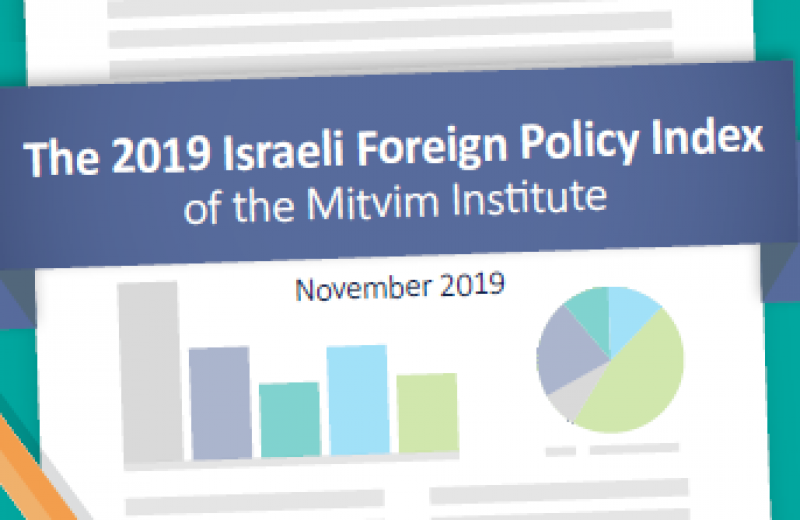
The 2019 Israeli Foreign Policy Index
Findings of the Mitvim Institue Poll, November 2019
The seventh annual public opinion poll of the Mitvim Institute on Israel’s foreign policy was conducted in September 2019. It was carried out by the Rafi Smith Institute and in cooperation with Friedrich-Ebert-Stiftung, among a representative sample of Israel’s adult population (700 men and women, Jews and Arabs) and with a margin of error of 3.5%. This report presents the poll’s key findings, grouped under four categories: Israel’s foreign relations, Israel’s Foreign Service, Israel and its surrounding regions, and Israel and the Palestinians.
Key Findings:
A. Israel’s Foreign Relations
- Israelis rank their country’s global standing at 6.10 out of 10. This ranking has been improving every year since 2015.
- Israelis rank the state of Israel-US relations at 7.75 out of 10. This ranking is similar to that of 2018, and is higher than in previous years.
- Israelis see Russia as the most important country for Israel besides the US, followed by Germany, Great Britain, China, France and Egypt.
- 30% of the public thinks that if Benny Gantz will serve as prime minister then Israel’s foreign relations will deteriorate. 25% think they will improve and 27% do not expect any change.
- Israelis want their next government to strengthen the Ministry of Foreign Affairs (MFA; ranking of 7.41 out of 10), and then improve ties with the EU (7.26), improve ties with Arab countries (7.12), improve ties with Mediterranean countries (6.96) and advance peace with the Palestinians (6.18).
- Israelis are split on what is more important for Israel to do ahead of next year’s US presidential elections – draw even closer to Trump and the Republican party (36%) or fix the crisis in its relations with the Democratic Party (34%).
- Israelis are split on whether Israel should prioritize building ties with democratic countries (40%) or should not consider regime type as a factor (40%).
B. Israel’s Foreign Service
- Israelis rank their government’s handling of foreign policy at 5.99 out of 10. This ranking has been improving every year since 2015.
- Israelis rank the Ministry of Foreign Affairs’ (MFA) fulfillment of its mission at 5.58 out of 10. This ranking has been improving every year since 2015. The status of the MFA is ranked at 5.37.
- 39% of the public thinks that the main thing an Israeli diplomat does is advancing diplomatic relations (39%), followed by explaining Israel’s positions (18%), representing Israel at events (15%), advancing economic relations (7%), and assisting Israel in distress abroad (4%).
- 50% of Israelis think that Israel should take into account, to a moderate or large extent, the impact of its policy decisions on Diaspora Jews. 35% think this should be taken into account to a limited extent, or none at all.
- In light of the global demonstrations regarding the climate crisis, 43% of Israelis think Israel should focus on solving its own problems. 35% think it should play a more active role in solving global problems.
C. Israel and its Surrounding Regions
- The Israeli public is divided as to whether Israel belongs more to the Middle East (32%), Europe (27%), or the Mediterranean Basin (21%).
- A vast majority of Israelis (68%) think that regional cooperation between Israel and Middle Eastern countries is possible. 20% think it is not.
- Saudi Arabia (25%) and Egypt (19%) are the Arab countries with which Israelis see the most importance in cooperating. Jordan is ranked next, with 3%, and 34% think that Israel should not try to develop cooperation with any Arab country.
- A vast majority of Israelis (71%) think that the peace with Jordan was and still is a strategic asset for Israel. Only 16% think it is less important for Israel today than it was in the past.
- 45% of Israelis think that the EU is currently more of a foe to Israel than a friend (27%). In 2018, 55% thought the EU was a foe, while 18% regarded it as a friend.
- The EU’s image in Israel can be most improved through statements by European politicians on the importance of ties with Israel (32%) and by disseminating more information on existing cooperation between Israel and the EU (31%).
- A majority of Israelis (53% vs. 32%) think that Israel should try to improve its relations with Turkey.
D. Israel and the Palestinians
- A majority of the Israeli public (55% vs. 24%) think that Israel’s Arab citizens should play a more central role in advancing peace with the Palestinians. However, only 37% think that Israel’s Arab citizens should play a more central role in the formulation of Israel’s foreign policy. 45% think they should not.
- A majority of the public (61%) think that Palestinian President Abbas is not a partner for peace negotiations with Israel. 20% think he is.
- Apart from the US, Israelis would most like to see (26%) the Arab Quartet (Egypt, Jordan, Saudi Arabia and the UAE) mediate in the Israeli-Palestinian peace process, followed by Russia (13%), the EU (12%), the UN (9%) and China (4%).
- 46% of Israelis think that peace between Israel and Gulf states can be reached even without progress in the Israeli-Palestinian peace process. 32% think that it can be reached only after progress is made in the peace process.
- Israelis are divided on how to prevent another with in Gaza. 24% think it can be done through strengthening Israeli deterrence, 17% believe it can be done through Israeli-Palestinian negotiations, and 14% believe it can be done through international mediation. 32% believe that another war in Gaza is unavoidable.
- 55% of the public stated that their image of the UN did not change following the efforts conducted by the UN envoy to the Middle East to prevent war between Israel and Hamas. 13% stated their image changed to the worse, and 12% to the better.


